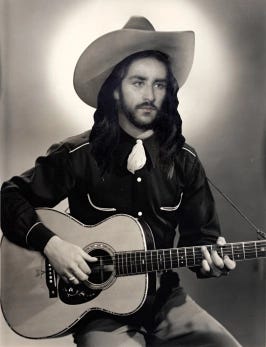Welcome to my second edition of Abundant Living. As promised, half the length of the last one! As always, no pressure to pay, I’m happy to have you. If you want to pay…
And otherwise please enjoy and please share. Once I get to 1,000 (free or otherwise) subscriptions, I’ll post my Peter Murphy profile that was killed a while back. I’m also going to eventually add monthly playlists but that’s…later. In the meantime, don’t watch that, watch this!
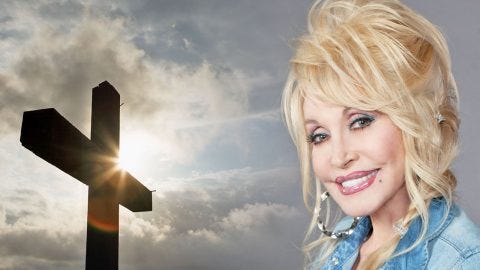
Last Friday, after a panel discussion on the hosts’ dream gospel supergroup lineups, the Steve Harvey Morning Show ran a regular segment called “Run That Prank.” Run That Prank, as you either know or can probably guess, is a prank call segment. Friday’s call, on the day commemorating Jesus’ crucifixion, was to a minister. The prank caller, comedian Thomas “Nephew Tommy” Miles, pretended to be a chiseler who had attended the pastor’s church once three years ago and now wanted a handout. The minister handled the prank part of the call reasonably well (losing his temper eventually but making it clear that actual congregants were being taken care of) and took in (reasonably) good humor the revelation that the call was all a setup by a minister friend. It certainly could have been more excruciating than it was. But I couldn’t imagine the call left a particularly sweet taste in the mouths of anyone involved. Or maybe I was just irked that none of the hosts’ initial gospel supergroups had Patti LaBelle in the roster. One of them went for Alicia Keys. Mavis Staples didn’t even come up. As a pale and/or Jew (not getting into that convo if you paid me), it certainly wasn’t my place to have an opinion but, still, I will hackle up for any past member of LaBelle…
Steve Harvey’s taste in morning hijinks is, agreed, not my lookout. But I do love weird and weirder social interactions with the living G-d. So, because of this and her recent viral postings, I’ve been thinking about Dolly Parton ever since. And 16 Horsepower because goth, and all of its children, is always on my mind.
I’m a “cultural” Jew. Meaning (if anything) that Zionists consider me a softboi and Nazis, while happily agreeing with the Zionist assessment, would still kill me. I believe in God but not so you’d notice. Most of my pals are atheist/agnostic/borderline sketchy gnostic and my scripture is pretty much:
Don’t do any of the really- top three or four- bad shit most religions agree on.
Give thanks regularly but mainly pray on flights and when my mom is sick.
Don’t read non-music related books blurbed by musicians.
But I also find a lot of my pals’ contempt for religion pretty boring and I generally find music that comes from a place of faith interesting on its face. After all, some, like, say, Ahmad Zahir or Noura Mint Seymali, is essential to anyone who digs any kind of transcendence and/or pop at all. We all love seeker music (especially when it fits within our hep psych or roots framework). I also, despite my background OR probably/definitely because I didn’t have to deal with any of its limitations or oppressions growing up, dig the heck out of some Christian music. And I don’t just mean the admittedly boss yearnin’ and searchin’ in a secular world music of Mountain Goats and Okkervil River but, like, that real Christ On His Cross shit. Not just the faith, but the church. After all, I wouldn’t be a black metal fan if I didn’t like costumes and rules.
As with all my taste, what draws me is a wild hodgepodge. Since I didn’t grow up with it, Christian rock and indie usually just sounds like milder versions of bands I don’t get down with in the first place. There’s nothing wrong with the (trailblazing Christian alt rock label) Tooth & Nail roster, but I don’t fuck with those pedalboard soundscapes when they’re made by English libertines nor by West Coast libertarians so it would be sheer condescension to grok it just because it came from fresh faced Jesus likers. Anyway, who cares about what is likable. Nobody here putting “God is Like” bumper stickers on the rear of their vespas. What I love most, in their two extremely different approaches to and from faith and how they’re received by music fans, is America’s (only undisputed) sweetheart Dolly Parton and the slightly less adored music of Denver, Colorado’s greatest rockabilly goth country export, 16 Horsepower.
(Hedging Sidenote 1: I realize neither of these are particularly controversial choices and a fair segment of their respective fandom is made up of dilettante hipsters- an appellation I’d be delusional to deny- but I save my contrarianism for twitter and day to day life. Here in my newsletter… I am of my people!) (I’m also arguing that both artists’ faiths aren’t fully considered by my fellow d. hipsters and that ignores a key aspect of their art. So, in my on-brand insistence that even those who like what I like don’t like it correctly, you’re still getting your money’s worth.)
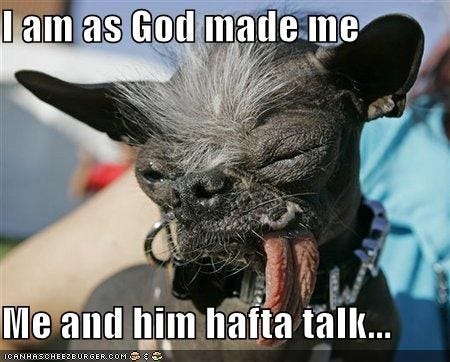
For most, Dolly Parton doesn’t need a musical or cultural explainer. Everyone, whether one, before hearing a note of her music, repeated jokes on the playground about her inability to see her own shoes, or grew up with parents/grandparents playing “Coat of Many Colors” or just, at any point in time, owned a TV or radio, knows who Dolly Parton is. There was a period, after Best Little Whorehouse in Texas and back when people still said things like “I like everything but rap and country” without everyone in a country mile rolling their eyes, that she was as known in popular culture more for her sheer Dollyness than her music, but I (like to) think that that’s no longer the case. Not that she ever seemed to mind. Part of her appeal is the self effacement that puts “it costs a lot of money to look this cheap” in the quotation books. You can enjoy a good cry of shared grief watching Parton tear up talking about Kenny Rogers even if you’re one of the rare apostates who doesn’t consider “Jolene” one of the greatest songs of the last thousand years. (“Jolene” is not currently my favorite Dolly Parton song. It’s probably second to “The Bargain Store” in my heart. The Hagia Sophia is not my favorite building either but facts is facts.)

There are critics far better equipped to discuss the specific genius of Dolly Parton’s music. I’m admittedly one of those “Notes and Chords Mean Nothing To Me” types that people who bemoan contemporary criticism’s focus on culture over “the music, man” hold in (perfectly reasonable) contempt. Just because I sing in a band doesn’t mean I know how any of this stuff works. Conversely, in 2007, Pitchfork gave Jolene a 5.8 so it’s not like knowing what one is talking about means one knows what one is talking about. Regardless, much as I love all of Parton’s music, from the so-called schmaltz to the gospel lite-funk of “Here I Am” to 2008’s self-referentialy slick Backwoods Barbie (which I bought at Union Square Virgin Megastore RIP) to her (better than the original) cover of “Stairway to Heaven” to her Easter song “He’s Alive” (because by the end it sounds like a Sisters of Mercy song), that’s not what I’m thinking about this week.
(Hedging sidenote 2: The guy who wrote the P4K review is a genuinely fantastic writer and historian about comic books. Everybody is allowed a bum piece or two!)
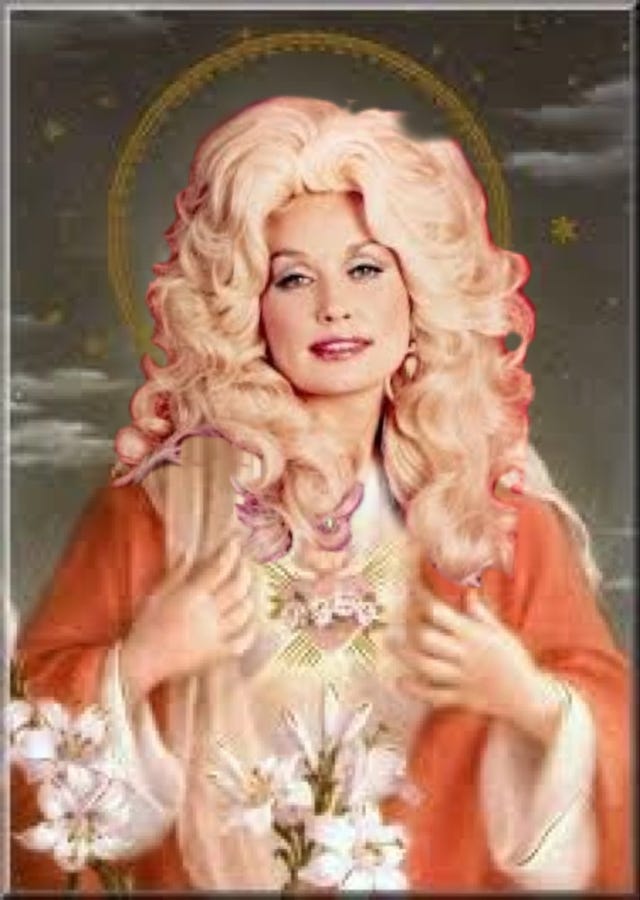
Dolly Parton is (arguably? inarguably?) the most universally beloved American Christian. (Martin Luther King Jr. doesn’t count because a fair portion of people who claim to love him actually hate everything he stood for. They just like misquoting him to concern troll Black Lives Matter activists.) But Dolly Parton, loud as hell in her faith, is adored by evangelicals and atheists alike. There are some devout Christians who consider Ms. Parton “of the devil” because she’s not suitably obsessed with wishing damnation upon the gays and others who got mad when she wasn’t sufficiently racist. But they’re in the minority and their websites look like they’re still hosted by a particularly thumbless Anglefire. Most Christian media I’ve seen seem to simply adore her or, if somewhat critical, they on balance take her as an acceptable advocate for Christ in a fallen world. I even name searched “Dolly Parton” on the conservative Catholic website, First Things, and all that came up was hand wringing about cloned sheep.
I wonder how exactly a secular culture takes Dolly Parton, or at least gives her the serious consideration she merits. In some ways she’s the utopian West Wing ideal of a “good Christian.” She’s adamantly non-judgmental in all areas of social mores and her LGBTQ fanbase is enormous. She was on the cover of Playboy for gosh sake. But I feel like it does her entirety, as an artist and a person, a disservice to take her solely as a conveniently spiritual eunuch. It also ignores her actual discography. Parton is a devout believer in Christ as Redeemer and blood of the lamb and all that other groovy gore and ineffability. Looking at the voting patterns of devout Christians, her live-and-let-live joie de vivre does not exactly seem representative of any larger popular church as it stands now. (I know Twitter Liberals like to pretend that conservatives aren’t “real” Christians but, buddies, they is.) So do we see her as an anomaly? That doesn’t feel… accurate to her intentions. I can’t quite get a handle on it, nor do I intend to. I love that she’s not a bigot. But I also love that she sees her music as her ministry to the world. I guess if critics are encouraged to proselytize that messianic U2 is a great rock band with more than two good albums there’s room to suppose that some grand godliness flowing through Dolly Parton is what makes her more than just a real charmer. Just picture God wearing Bono sunglasses if that helps. And to those who say “you’re thinking too much. I only care about the music” I will respectfully point to the last ten years of discourse pertaining to art and artists. If we’re going to elevate a bunch of mediocre black metal bands for having the good taste of preferring Jacobin over Mein Kampf then we have to credit a genius like Dolly Parton on her core beliefs as well.
(Hedging sidenote 3: We don’t have to do anything actually. Just working stuff out in my newsletter!)
If Dolly Parton inhabits a Christian faith that’s admirable in its refusal to judge, 16 Horsepower inhabits a Christian faith that, while free of bigotry, is admirable in its insistence on judging EEEEEEEVERYBODY.
Assuming that the reader is not as familiar with them as they are with Dolly Parton, 16 Horsepower were a band that existed between 1992 and 2005. They played a hybrid of Americana and bluegrass, inflected with a rock vernacular (or, ugh, “energy”) highly indebted to every early-1980s Los Angeles band with Day of the Dead tattoos and substance abuse issues. 16 Horsepower consisted of David Eugene Edwards and some other guys that I’m sure are very nice. If you find the Louvin Brothers’ Satan Is Real a tad subtle for your taste and like the TV show Justified but wish Timothy Olyphant went heavier on the mascara, 16 Horsepower is the band for you. All their albums are quite good. Their 1996 album Sackcloth ‘n’ Ashes is a flippin’ masterpiece.
With songs like “Black Soul Choir” and “Neck On the New Blade,” it’s almost redundant to use terms like “fire and brimstone” in regards to David Eugene Edwards’ lyrical concerns. Edwards’ God is a God that promises only that you, me, and everyone else will get what’s coming to us. As much as I adore Nick Cave (an obvious influence on 16 Horsepower) and don’t doubt his beliefs, the Australian preacher’s songs of judgement coming down from on high are literary exercises compared to Edwards’ first-person passion plays. Every 16 Horsepower song is a Flannery O’Connor short story where the freakish protagonist is in the absolute right.
Strangely, 16 Horsepower albums never really shot up the charts.
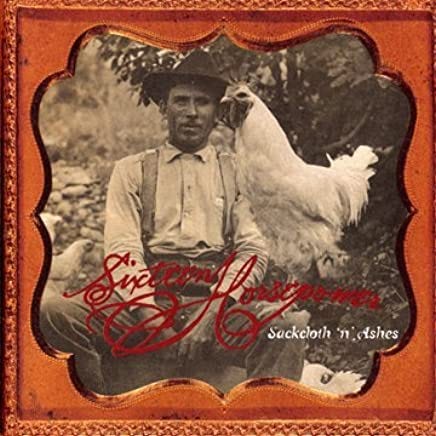
What’s the appeal of the implicit dogma of “My knees was made for kneelin'/ An that's just what they'll do/ One of these days little girl/ I'll go down an pray for you”? Well, besides the haha clever of playing off of a Nancy Sinatra hit, the abnegation of agency before a higher power mixed with a sassy, arguably sexy, self righteousness either hits you in all the right spots or it don’t. Not a lot of room for compromise here, which is it’s own appeal (or isn’t). In the same way conservatism can lure in those looking for simple answers and conspiracy worldview draws in those looking for a unified field, even humanist simps such as myself can get tired of the flattering wishy washiness of spiritualism. 16 Horsepower offer a faith that relegates all to the sinner category, no exceptions and no salvation outside complete surrender. And they never actually say surrender’ll necessarily do the job either. All of us going down together is still all of us in it together and there’s a bracing satisfaction there. Sometimes one wants a god who’ll drive the nail in.
At some point I should stop using the generalized “one.” You, reader, may want none of this. And that’s… real understandable. Maybe that’s why I’m trying so hard to make more of Dolly Parton’s faith than even she wants to accentuate; maybe I just want to get smacked around a bit, either by an interventionist god or a singer with a hairdo and a drawl.
I’ll ask my therapist about all this when/if we’re ever allowed within six feet of anyone over sixty again.
P.S. I wanted to fit a joke somewhere about The Endtime as discussed in the works of Lungfish but I couldn’t make it work.
Thanks for reading! I’d be extremely grateful if you shared.
